- Home
- Louisa May Alcott
Good Wives Page 28
Good Wives Read online
Page 28
"Oh, yes!" said Jo, and he was quite satisfied, for she folded both hands over his are, and looked up at him with an expression that plainly showed how happy she would be to walk through life beside him, even though she had no better shelter than the old umbrella, if he carried it.
It was certainly proposing under difficulties, for even if he had desired to do so, Mr. Bhaer could not go down upon his knees, on account of the mud. Neither could he offer Jo his hand, except figuratively, for both were full. Much less could he indulge in tender remonstrations in the open street, though he was near it. So the only way in which he could express his rapture was to look at her, with an expression which glorified his face to such a degree that there actually seemed to be little rainbows in the drops that sparkled on his beard. If he had not loved Jo very much, I don't think he could have done it then, for she looked far from lovely, with her skirts in a deplorable state, her rubber boots splashed to the ankle, and her bonnet a ruin. Fortunately, Mr.
Bhaer considered her the most beautiful woman living, and she found him morèJove−like" than ever, though his hat−brim was quite limp with the little rills trickling thence upon his shoulders (for he held the umbrella all over Jo), and every finger of his gloves needed mending.
Passers−by probably thought them a pair of harmless lunatics, for they entirely forgot to hail a bus, and strolled leisurely along, oblivious of deepening dusk and fog. Little they cared what anybody thought, for they were enjoying the happy hour that seldom comes but once in any life, the magical moment which bestows youth on the old, beauty on the plain, wealth on the poor, and gives human hearts a foretaste of heaven. The Professor looked as if he had conquered a kingdom, and the world had nothing more to offer him in the way of bliss. While Jo trudged beside him, feeling as if her place had always been there, and wondering how she ever could have chosen any other lot. Of course, she was the first to speakintelligibly, I mean, for the emotional remarks which followed her impetuous "Oh, yes!" were not of a coherent or reportable character.
"Friedrich, why didn't you..."
"Ah, heaven, she gifs me the name that no one speaks since Minna died!" cried the Professor, pausing in a puddle to regard her with grateful delight.
"I always call you so to myselfI forgot, but I won't unless you like it."
"Like it? It is more sweet to me than I can tell. Say `thou', also, and I shall say your language is almost as beautiful as mine."
"Isn't `thou' a little sentimental?" asked Jo, privately thinking it a lovely monosyllable.
"Sentimental? Yes. Thank Gott, we Germans believe in sentiment, and keep ourselves young mit it. Your English `you' is so cold, say `thou', heart's dearest, it means so much to me," pleaded Mr. Bhaer, more like a CHAPTER 23. Under the Umbrella
140
Good Wives
romantic student than a grave professor.
"Well, then, why didn't thou tell me all this sooner?" asked Jo bashfully.
"Now I shall haf to show thee all my heart, and I so gladly will, because thou must take care of it hereafter.
See, then, my Joah, the dear, funny little nameI had a wish to tell something the day I said goodbye in New York, but I thought the handsome friend was betrothed to thee, and so I spoke not. Wouldst thou have said `Yes', then, if I had spoken?"
"I don't know. I'm afraid not, for I didn't have any heart just then."
"Prut! That I do not believe. It was asleep till the fairy prince came through the wood, and waked it up. Ah, well, `Die erste Liebe ist die beste', but that I should not expect."
"Yes, the first love is the best, but be so contented, for I never had another. Teddy was only a boy, and soon got over his little fancy," said Jo, anxious to correct the Professor's mistake.
"Good! Then I shall rest happy, and be sure that thou givest me all. I haf waited so long, I am grown selfish, as thou wilt find , Professorin."
"I like that," cried Jo, delighted with her new name. "Now tell me what brought you, at last, just when I wanted you?"
"This." And Mr. Bhaer took a little worn paper out of his waistcoat pocket.
Jo unfolded it, and looked much abashed, for it was one of her own contributions to a paper that paid for poetry, which accounted for her sending it an occasional attempt.
"How could that bring you?" she asked, wondering what he meant.
"I found it by chance. I knew it by the names and the initials, and in it there was one little verse that seemed to call me. Read and find him. I will see that you go not in the wet."
IN THE GARRET
Four little chests all in a row,
Dim with dust, and worn by time,
All fashioned and filled, long ago,
By children now in their prime.
Four little keys hung side by side,
With faded ribbons, brave and gay
When fastened there, with childish pride,
Long ago, on a rainy day.
Four little names, one on each lid,
Carved out by a boyish hand,
And underneath there lieth hid
Histories of the happpy band
Once playing here, and pausing oft
To hear the sweet refrain,
That came and went on the roof aloft, In the falling summer rain.
CHAPTER 23. Under the Umbrella
141
Good Wives
"Meg" on the first lid, smooth and fair.
I look in with loving eyes,
For folded here, with well−known care,
A goodly gathering lies,
The record of a peaceful life
Gifts to gentle child and girl,
A bridal gown, lines to a wife,
A tiny shoe, a baby curl.
No toys in this first chest remain,
For all are carried away,
In their old age, to join again
In another small Meg's play.
Ah, happy mother!
Well I know You hear, like a sweet refrain,
Lullabies ever soft and low
In the falling summer rain.
"Jo" on the next lid, scratched and worn,
And within a motley store
Of headless, dolls, of schoolbooks torn,
Birds and beasts that speak no more,
Spoils brought home from the fairy ground
Only trod by youthful feet,
Dreams of a future never found,
Memories of a past still sweet,
Half−writ poems, stories wild,
April letters, warm and cold,
Diaries of a wilful child,
Hints of a woman early old,
A woman in a lonely home,
Hearing, like a sad refrain
"Be worthy, love, and love will come,"
In the falling summer rain.
My Beth! the dust is always swept
From the lid that bears your name,
As if by loving eyes that wept,
By careful hands that often came.
Death cannonized for us one saint,
Ever less human than divine,
And still we lay, with tender plaint,
Relics in this household shrine
The silver bell, so seldom rung,
The little cap which last she wore,
The fair, dead Catherine that hung
By angels borne above her door.
The songs she sang, without lament,
In her prison−house of pain,
Forever are they sweetly blent
With the falling summer rain.
CHAPTER 23. Under the Umbrella
142
Good Wives
Upon the last lid's polished field
Legend now both fair and true
A gallant knight bears on his shield,
"Amy" in letters gold and blue.
Within lie snoods that bound her hair,
Slippers that have danced their last,
Faded flowers laid by with care,
Fans whos
e airy toils are past,
Gay valentines, all ardent flames,
Trifles that have borne their part
In girlish hopes and fears and shames,
The record of a maiden heart
Now learning fairer, truer spells,
Hearing, like a blithe refrain,
The silver sound of bridal bells
In the falling summer rain.
Four little chests all in a row,
Dim with dust, and worn by time,
Four women, taught by weal and woe
To love and labor in their prime.
Four sisters, parted for an hour,
None lost, one only gone before,
Made by love's immortal power,
Nearest and dearest evermore.
Oh, when these hidden stores of ours
Lie open to the Father's sight,
May they be rich in golden hours,
Deeds that show fairer for the light,
Lives whose brave music long shall ring,
Like a spirit−stirring strain,
Souls that shall gladly soar and sing
In the long sunshine after rain.
"It's very bad poetry, but I felt it when I wrote it, one day when I was very lonely, and had a good cry on a rag bag. I never thought it would go where it could tell tales," said Jo, tearing up the verses the Professor had treasured so long.
"Let it go, it has done it's duty, and I will haf a fresh one when I read all the brown book in which she keeps her little secrets," said Mr. Bhaer with a smile as he watched the fragments fly away on the wind. "Yes," he added earnestly, "I read that, and I think to myself, She has a sorrow, she is lonely, she would find comfort in true love. I haf a heart full, full for her. Shall I not go and say, "If this is not too poor a thing to gif for what I shall hope to receive, take it in Gott's name?"
"And so you came to find that it was not too poor, but the one precious thing I needed," whispered Jo.
"I had no courage to think that at first, heavenly kind as was your welcome to me. But soon I began to hope, and then I said, Ì will haf her if I die for it,' and so I will!" cried Mr. Bhaer, with a defiant nod, as if the walls of mist closing round them were barriers which he was to surmount or valiantly knock down.
CHAPTER 23. Under the Umbrella
143
Good Wives
Jo thought that was splendid, and resolved to be worthy of her knight, though he did not come prancing on a charger in gorgeous array.
"What made you stay away so long?" she asked presently, finding it so pleasant to ask confidential questions and get delightful answers that she could not keep silent.
"It was not easy, but I could not find the heart to take you from that so happy home until I could haf a prospect of one to gif you, after much time, perhaps, and hard work. How could I ask you to gif up so much for a poor old fellow, who has no fortune but a little learning?"
"I'm glad you are poor. I couldn't bear a rich husband," said Jo decidedly, adding in a softer tone, "Don't fear poverty. I've known it long enough to lose my dread and be happy working for those I love, and don't call yourself oldforty is the prime of life. I couldn't help loving you if you were seventy!"
The Professor found that so touching that he would have been glad of his handkerchief, if he could have got at it. As her couldn't, Jo wiped his eyes for him, and said, laughing, as she took away a bundle or two...
"I may be strong−minded, but no one can say I'm out of my sphere now, for woman's special mission is supposed to be drying tears and bearing burdens. I'm to carry my share, Friedrich, and help to earn the home.
Make up your mind to that, or I'll never go," she added resolutely, as he tried to reclaim his load.
"We shall see. Haf you patience to wait a long time, Jo? I must go away and do my work alone. I must help my boys first, because, even for you, I may not break my word to Minna. Can you forgif that, and be happy while we hope and wait?"
"Yes, I know I can, for we love one another, and that makes all the rest easy to bear. I have my duty, also, and my work. I couldn't enjoy myself if I neglected them even for you, so there's no need of hurry or impatience.
You can do your part out West, I can do mine here, and both be happy hoping for the best, and leaving the future to be as God wills."
"Ah! Thou gifest me such hope and courage, and I haf nothing to gif back but a full heart and these empty hands," cried the Professor, quite overcome.
Jo never, never would learn to be proper, for when he said that as they stood upon the steps, she just put both hands into his, whispering tenderly, "Not empty now," and stooping down, kissed her Friedrich under the umbrella. It was dreadful, but she would have done it if the flock of draggle−tailed sparrows on the hedge had been human beings, for she was very far gone indeed, and quite regardless of everything but her own happiness. Though it came in such a very simple guise, that was the crowning moment of both their lives, when, turning from the night and storm and loneliness to the household light and warmth and peace waiting to receive them, with a glad "Welcome home!" Jo led her lover in, and shut the door.
CHAPTER 24. Harvest Time
For a year Jo and her Professor worked and waited, hoped and loved, met occasionally, and wrote such voluminous letters that the rise in the price of paper was accounted for, Laurie said. The second year began rather soberly, for their prospects did not brighten, and Aunt March died suddenly. But when their first sorrow was overfor they loved the old lady in spite of her sharp tonguethey found they had cause for rejoicing, for she had left Plumfield to Jo, which made all sorts of joyful things possible.
"It's a fine old place, and will bring a handsome sum, for of course you intend to sell it," said Laurie, as they CHAPTER 24. Harvest Time
144
Good Wives
were all talking the matter over some weeks later.
"No, I don't," was Jo's decided answer, as she petted the fat poodle, whom she had adopted, out of respect to his former mistress.
"You don't mean to live there?"
"Yes, I do."
"But, my dear girl, it's an immense house, and will take a power of money to keep it in order. The garden and orchard alone need two or three men, and farming isn't in Bhaer's line, I take it."
"He'll try his hand at it there, if I propose it."
"And you expect to live on the produce of the place? Well, that sounds paradisiacal, but you'll find it desperate hard work."
"The crop we are going to raise is a profitable one," And Jo laughed.
"Of what is this fine crop to consist, ma'am?"
"Boys. I want to open a school for little ladsa good, happy, homelike school, with me to take care of them and Fritz to teach them." "That's a truly Joian plan for you! Isn't that just like her?" cried Laurie, appealing to the family, who looked as much surprised as he.
"I like it," said Mrs. March decidedly.
"So do I," added her husband, who welcomed the thought of a chance for trying the Socratic method of education on modern youth.
"It will be an immense care for Jo," said Meg, stroking the head or her one all−absorbing son.
"Jo can do it, and be happy in it. It's a splendid idea. Tell us all about it," cried Mr. Laurence, who had been longing to lend the lovers a hand, but knew that they would refuse his help.
"I knew you'd stand by me, sir. Amy does tooI see it in her eyes, though she prudently waits to turn it over in her mind before she speaks. Now, my dear people," continued Jo earnestly, "just understand that this isn't a new idea of mine, but a long cherished plan. Before my Fritz came, I used to think how, when I'd made my fortune, and no one needed me at home, I'd hire a big house, and pick up some poor, forlorn little lads who hadn't any mothers, and take care of them, and make life jolly for them before it was too late. I see so many going to ruin for want of help at the right minute, I love so to do anything for them, I seem to feel their wants, and sympathize with their troubles, and oh, I should so like to be a mother
to them!"
Mrs. March held out her hand to Jo, who took it, smiling, with tears in her eyes, and went on in the old enthusiastic way, which they had not seen for a long while.
"I told my plan to Fritz once, and he said it was just what he would like, and agreed to try it when we got rich.
Bless his dear heart, he's been doing it all his lifehelping poor boys, I mean, not getting rich, that he'll never be. Money doesn't stay in his pocket long enough to lay up any. But now, thanks to my good old aunt, who loved me better than I ever deserved, I'm rich, at least I feel so, and we can live at Plumfield perfectly well, if we have a flourishing school. It's just the place for boys, the house is big, and the furniture strong and plain.
CHAPTER 24. Harvest Time
145
Good Wives
There's plenty of room for dozens inside, and splendid grounds outside. They could help in the garden and orchard. Such work is healthy, isn't it, sir? Then Fritz could train and teach in his own way, and Father will help him. I can feed and nurse and pet and scold them, and Mother will be my stand−by. I've always longed for lots of boys, and never had enough, now I can fill the house full and revel in the little dears to my heart's content. Think what luxury Plumfield my own, and a wilderness of boys to enjoy it with me."
As Jo waved her hands and gave a sigh of rapture, the family went off into a gale of merriment, and Mr.
Laurence laughed till they thought he'd have an apoplectic fit.
"I don't see anything funny," she said gravely, when she could be heard. "Nothing could be more natural and proper than for my Professor to open a school, and for me to prefer to reside in my own estate."
"She is putting on airs already," said Laurie, who regarded the idea in the light of a capital joke. "But may I inquire how you intend to support the establishment? If all the pupils are little ragamuffins, I'm afraid your crop won't be profitable in a worldly sense, Mr. Bhaer."
"Now don't be a wet−blanket, Teddy. Of course I shall have rich pupils, alsoperhaps begin with such altogether. Then, when I've got a start, I can take in a ragamuffin or two, just for a relish. Rich people's children often need care and comfort, as well as poor. I've seen unfortunate little creatures left to servants, or backward ones pushed forward, when it's real cruelty. Some are naughty through mismanagment or neglect, and some lose their mothers. Besides, the best have to get through the hobbledehoy age, and that's the very time they need most patience and kindness. People laugh at them, and hustle them about, try to keep them out of sight, and expect them to turn all at once from pretty children into fine young men. They don't complain much plucky little soulsbut they feel it. I've been through some− thing of it, and I know all about it. I've a special interest in such young bears, and like to show them that I see the warm, honest, well−meaning boys'

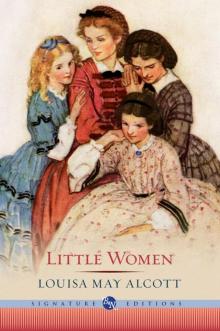 Little Women
Little Women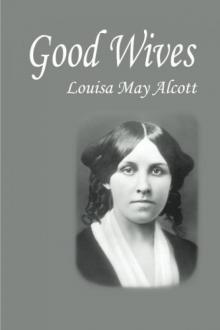 Good Wives
Good Wives Jo's Boys
Jo's Boys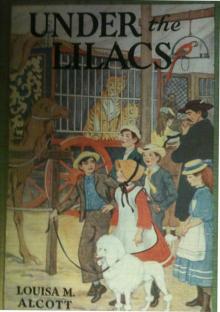 Under the Lilacs
Under the Lilacs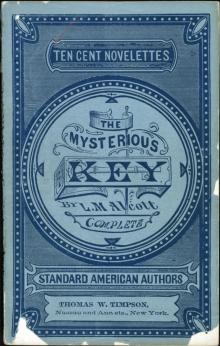 The Mysterious Key and What It Opened
The Mysterious Key and What It Opened The Inheritance
The Inheritance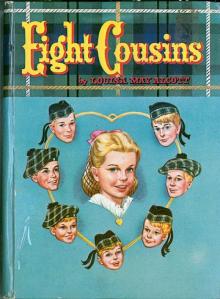 Eight Cousins
Eight Cousins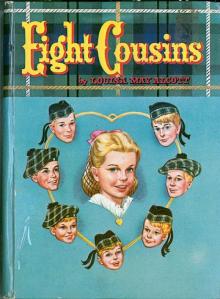 Eight Cousins; Or, The Aunt-Hill
Eight Cousins; Or, The Aunt-Hill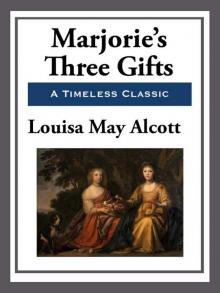 Marjorie's Three Gifts
Marjorie's Three Gifts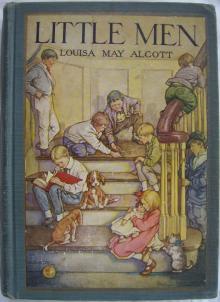 Little Men
Little Men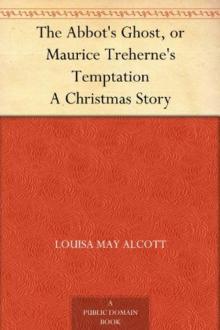 The Abbot's Ghost, or Maurice Treherne's Temptation: A Christmas Story
The Abbot's Ghost, or Maurice Treherne's Temptation: A Christmas Story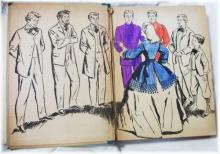 Rose in Bloom
Rose in Bloom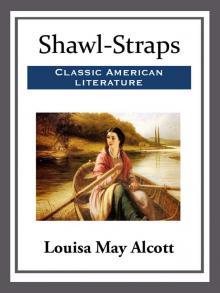 Shawl-Straps
Shawl-Straps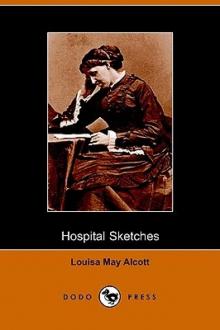 Hospital Sketches
Hospital Sketches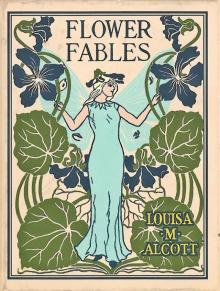 Flower Fables
Flower Fables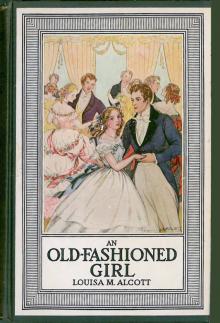 An Old-Fashioned Girl
An Old-Fashioned Girl The Candy Country
The Candy Country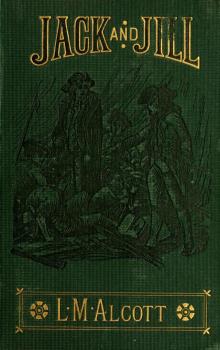 Jack and Jill
Jack and Jill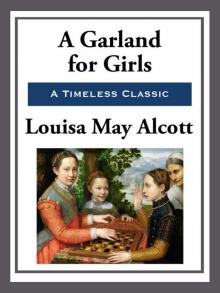 A Garland for Girls
A Garland for Girls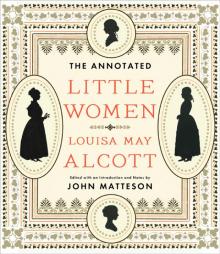 The Annotated Little Women
The Annotated Little Women A Classic Christmas
A Classic Christmas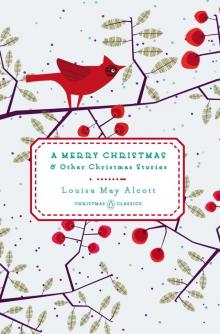 A Merry Christmas
A Merry Christmas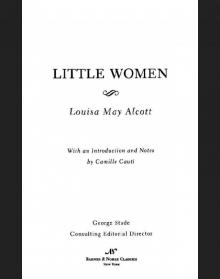 Little Women (Barnes & Noble Classics Series)
Little Women (Barnes & Noble Classics Series)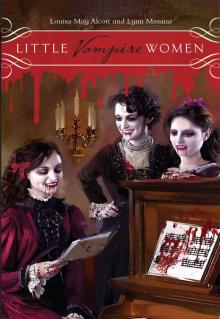 Little Vampire Women
Little Vampire Women